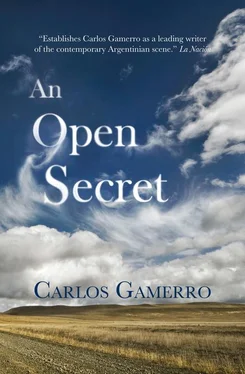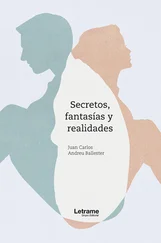“Eh. What’s on yer mind.” Sayago’s voice bursts obscenely into my thoughts. “Or are you going to skimp now I’ve told you what you wanted to know?”
“Give him whatever he likes Nene. The last one,” I mutter through the grim cloud of my own drunken haze.
Sayago raises it enthusiastically to his lips, sipping the film that clings to the glass, his mouth a sucker filling the hole with its grey tongue meat. After hoovering up every last drop, he opens his mouth and his voice almost breaks:
“Probably reckon I been talking ’cause you stood me some fucking cañas eh? Been told you can have Carmen eating out of yer hand with a few shots? Eh?”
“Calm down Carmen,” intervenes Licho, who can obviously see it coming.
“Get yer fucking hands off me!” Sayago shakes an arm no one’s touched. “I may be called Carmen but I’m more of a man than the lot of you put together, this shitty city boy comes along and you’re all running around after him kissing his arse and saying sorry! Sorry for what? Can you tell me what the crap any of this is to you? You don’t fool me. I know why you’re here.”
I tense in my seat, while my eyes dart about looking for something I can cleave his head open with if necessary, but for now he’s content just to shout.
“Think you’re better than us don’t you Buenos Aires. But I’m a Sayago or didn’t you know? It was a Sayago as killed Musurana, the most famous bandit in the region! Now you come along asking questions but you know what? We’re the ones ask the questions here. I still got friends in the force. Think things have changed that much do you?”
I sit there and stare at him without answering, wondering how much longer I’m going to have to keep up a calm front. Meanwhile, Porfirio Dupuy, alerted by all the shouting, has emerged from his mysterious caverns and tells us if we’re going to have a fight to have one outside, Licho suddenly remembers something very important he should have done a year ago and disappears through a side door, and Iturraspe stands a little way back from the table in case the glass starts flying.
“You’re all the same,” spews the not-so-ex-policeman. “When there’s any trouble you run screaming to us, Police! Police! and then when we’ve risked our necks you spit on us. And if at some point we ice someone you raise the ceiling, but if it’s one of our own you don’t give a monkey’s, not a monkey’s! It’s what you’re paid for you say. What do you know? Ever had to hold a dying comrade, try to cheer him up and lie to him that everything’s going to be all right when you know he’s on his way out, and then go and face his folks, his wife?”
“Yes,” I hiss through my teeth, but my interlocutor’s so wired he doesn’t realise I’ve answered his purely rhetorical question.
“Nobody who hasn’t been through it in the flesh has the right to question us about anything,” Corporal Sayago lets fly openly now, and at the expense of several more cackles manages to raise and swell his original slurring whine.
“If you want another drink just ask,” I breathe without looking at him. “There’s no need to shout.”
“I’ll shout all I like me! And you’ll give me another glass whether you like it or not!” he gets up from his chair and grabs the table with both hands as if to flip it over, but it’s really to steady himself. “You’re in my town now and if I tell you to buy me another drink you’ll buy me another drink get it? What’s up with the rest of you? You going to let some shitty city boy walk all over us just ’cause he’s got some money in his pocket! Come on, we’ll show him, come on! Think we’re afraid of you do you Buenos Aires? Afraid of you lot? Know what we do with puffed-up city boys here?”
He makes as if to unzip his flies, but his zipper gets stuck and, as he wrestles with it, one of the doors onto main street, the nearest one, bursts open and bounces back off the wall, and Sayago barely has time to look up before Guido’s on top of him heaving him by his hair to the floor in an arc and kicking him out into the street through the door Licho has been holding open as a precaution. Relieved at the prospect of a breath of fresh air, I go outside after them and am followed by Iturraspe and Nene Larrieu. His running shoes still undone, Guido kicks Sayago in the head, who, outlined against the battery of headlights on the Fiat Uno parked at right angles to the sidewalk with both its doors wide open, writhes on the ground like a slug with salt on its back. “May I?” I say to Guido, who hasn’t opened his vapour-clouded mouth except to breathe, and start laying into Sayago with my steel-capped shoes, connecting cleanly with his ribs as the cold clears my head a little, feeling the resistance of the bone yield after a few swings. Then suddenly I realise that, instead of helping me, Guido’s pulling on one arm and Nene Larrieu on the other, so I stop struggling. I’d’ve carried on till he was dead, I say to myself and for some reason the words calm me down.
Back inside, I buy us another round — minus the caña —to soothe our souls, and when I breathe in, deeper and deeper, my lungs fill completely. It’s a pleasant sensation. Our company — even Nene Larrieu, who, after calling Chacón to escort his ex-colleague to the little ward, breaks the habit of a lifetime and pours himself a neat gin, no ice — drink their drinks in silence.
“Good thing he never wanted to be a cop,” I remark after a while.
“That’s often the trouble with unbelieving converts,” Iturraspe points out. Out of deference to Guido I finish my drink as fast as I can and ride back with him in the car. Next morning, after a night of nightmares more vivid than the haze I wake up to, with the winter sun already high in the sky behind the raised blinds, I remember my return ticket to Buenos Aires, which this time I’ve quite forgotten to change.
“I DON’T KNOW WHAT I’M DOING HERE,” Clara Benoit had confessed to me with a vague sweep of the hand that might have included the freezing, empty dining room, the young eucalyptus wood outside the large windows — where one green and three blue tents have holed up till the end of the winter holidays — and the wrinkled surface of the lagoon, and beyond that who knows what vastnesses. “I mean look at this place, it’s depressing, I tell Papá to close up till summer but you know what he’s like, you must’ve got to know him well by now. Sorry,” she’d added. “You asked me about the church and there I go off at a tangent. Yes, I was there that afternoon. I went to see if Father Abeledo said anything about Darío. I don’t know why the others went but they did. There were a lot of people who never usually attended, I’ve seldom seen the church so full for an ordinary mass. What I remember most though was the silence. Pews creaking, shoes shuffling on the tiles, the occasional cough — but no one said a word. And to make matters worse the Father took longer than usual, which was quite a while. At the time I thought it was because he was preparing something special to say but apparently he was having one of his fits of depression … About Darío, of course. I don’t know what I was thinking of, the father’s words firiing us up and afterwards all of us leaving the church arm in arm, singing, behind Father Abeledo holding the cross on high, and marching on police headquarters. When I understood what he was saying I burst out crying. I couldn’t believe it of him and I couldn’t stop. Papá and Mamá, who was still alive back then, looked daggers at me and kept nudging me but there was nothing I could do and in the end I had to leave in the middle of the sermon, choking back the tears and everyone turning round and staring at me and already starting to whisper, nothing new, same as usual no doubt, it was no secret that for Darío I … You’d think by that stage they’d’ve got bored of talking about it. I mean twenty years is rather a lot. But they’re still singing the same tune aren’t they.”
Читать дальше












